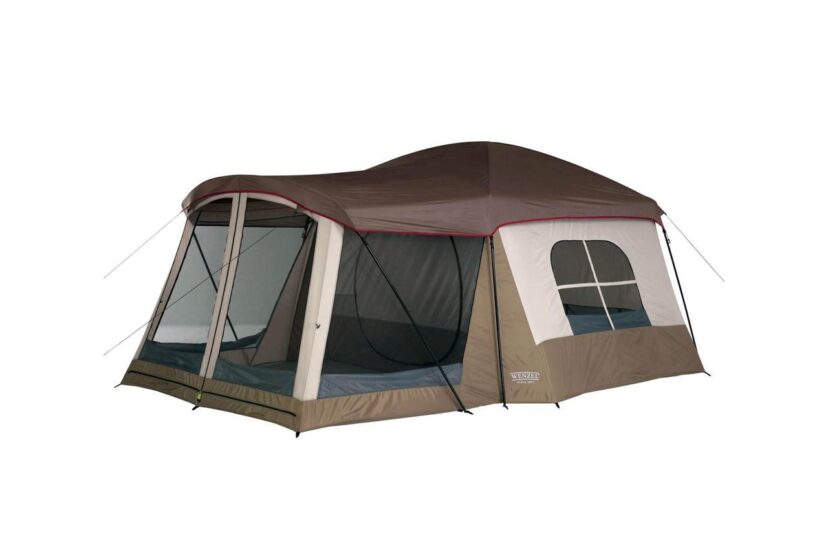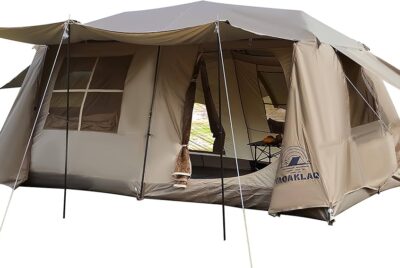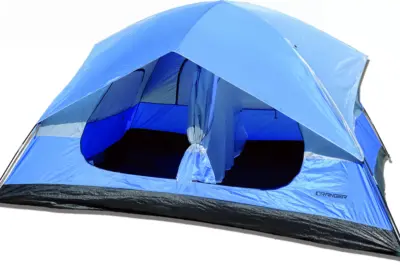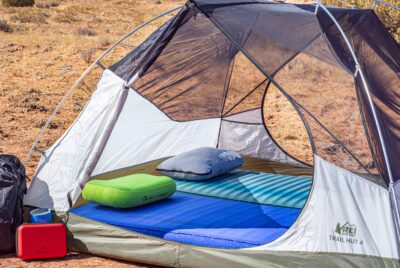A Guide to Screened Camping Tents
Introduction:
Embarking on a camping adventure takes us into the heart of nature, a freeing experience that reconnects us with the primal essence of the outdoors. As the sun sets and the stars emerge, there’s an undeniable magic in the air. However, the constant buzz of mosquitoes and other unwelcome insects can quickly diminish this enchantment. Fear not, as the solution to this age-old camping problem lies in screened camping tents. These marvels of outdoor engineering seamlessly blend the comforts of shelter with the unbridled freedom of the open air. In this guide, we explore the world of screened camping tents, highlighting their importance for both novice and seasoned campers alike, and how they are ready to redefine your camping escapades.
Understanding Screened Camping Tents:
Imagine an extraordinary tent for your camping adventures – a hero among tents! Meet the screened camping tent, truly fantastic. This tent not only shields you from weather but also immerses you in nature without bothersome bugs. Cleverly designed with mesh panels as bug barriers, it offers a clear view of your surroundings. The mesh acts like a tiny fence, keeping even the smallest bugs away. So, inside, you feel like part of nature, seeing everything outside. These tents surpass bug protection; they make camping incredibly comfortable, offering a cool way to enjoy the wild outdoors!
Key Features to Look For:
When you’re on the hunt for the perfect screened camping tent, it’s crucial to have knowledge about the key features that make a tent stand out. Begin with the materials – strong, weather-resistant fabrics are essential for durability and protection against the elements. A sturdy and user-friendly zipper system ensures easy access while keeping bugs away. Also, a robust frame serves as the tent’s backbone, providing stability in unpredictable weather. Choosing a tent with removable and washable mesh screens not only makes maintenance easy but also guarantees a fresh and bug-free environment on every adventure. These thoughtfully designed features turn a tent from a simple shelter into a haven, enhancing your camping experiences with practicality and long-lasting enjoyment.
Benefits of Screened Camping Tents:
Screened camping tents, with their meshed panels, offer benefits that extend beyond bug protection. Ventilation takes center stage, as the mesh panels allow a gentle breeze to flow into the tent, reducing condensation and keeping the interior cool during warm nights. The tent’s main feature is the unobstructed view of the surrounding landscape, fostering a connection with nature. Imagine waking up to the sunrise filtering through the mesh or falling asleep under a star-studded sky. Moreover, these tents provide a sanctuary from the elements without compromising the outdoor experience, making them ideal for those who relish the symbiotic relationship between comfort and the raw beauty of the great outdoors.
Choosing the Right Site:
Choosing the right campsite is a crucial decision when using a screened camping tent, influencing the overall camping experience. A well-chosen site improves both comfort and safety. Opt for a location with natural barriers like trees or shrubs, providing shelter from the elements and an extra layer of privacy. Moreover, the right site can significantly impact insect exposure, a key consideration when using a screened tent to repel pests. A spot with minimal standing water and away from stagnant areas reduces the likelihood of encountering mosquitoes and other bothersome insects. Additionally, assessing the ground for levelness is vital to ensure a more comfortable sleeping surface and prevent water pooling during rainfall. Ultimately, proper campsite selection enhances the effectiveness of the screened tent and contributes to an enjoyable and hassle-free camping adventure.
Setting Up Your Screened Camping Tent:
Setting up a screened camping tent presents a unique set of challenges that campers must face. One concern is the selection of a suitable landscape, as finding level ground can be tricky in the outdoors. Uneven surfaces may lead to discomfort during sleep and difficulties in securing the tent properly. Weather conditions also present significant issues, as strong winds can make it difficult to assemble and stabilize the tent. Moreover, choosing the right location is crucial to avoid potential hazards like falling branches or uneven ground. Additionally, campers need to be mindful of local wildlife, ensuring that their chosen site is free from potential encounters with animals that may be attracted to food odors or curious about the tent. Finally, understanding how to properly secure and anchor the tent is important to prevent it from collapsing or getting damaged in bad conditions. Overcoming these challenges requires careful planning, flexibility, and a keen awareness of the surroundings.
Maintenance Tips for Longevity of Screened Camping Tents
Ensuring a long life for a screened camping tent involves regular maintenance. First and foremost, proper cleaning is essential. After each camping trip, remove dirt, debris, and any stains using a mild soap solution and a soft brush. Pay attention to the zippers, ensuring they are free of dirt and lubricating them with silicone spray to prevent corrosion. UV exposure can weaken fabric over time, so storing the tent in a cool, dry place away from direct sunlight is crucial. Seam sealing and waterproofing should be periodically checked and reapplied as needed to maintain the tent’s resistance to rain. Additionally, inspect the tent poles for any signs of damage and replace any bent or broken sections. Storing the tent loosely in its bag rather than tightly rolled can help prevent fabric stress. Regular maintenance not only preserves the tent but also ensures a reliable and enjoyable camping experience for years to come.
Incorporating Screened CampingTents into Different Camping Styles:
Incorporating screened tents into various camping styles adds versatility and comfort to outdoor adventures. For traditional tent camping, a screened tent serves as a bug-free space, allowing campers to enjoy meals, play games, or relax without the nuisance of insects. In backpacking, where weight is a critical factor, lightweight and compact screened tents provide a convenient solution for bug protection in easy setups. Family camping benefits from larger screened tents that serve as areas for socializing, dining, or even as a sheltered play space for children. Car camping enthusiasts can enjoy spacious screened tents, expanding their living area and bringing a touch of home to the great outdoors. Whether it’s a solo backpacking trip or a family camping excursion, including a screened tent improves the camping experience by providing a sheltered, bug-free space to enjoy the natural surroundings.
Conclusion:
In conclusion, screened camping tents open up a world of possibilities for outdoor enthusiasts, providing a blend of comfort and connection with nature. Their bug-resistant design, unobstructed views, and ventilation make them a valuable addition to any camping trip. As you get ready for your next adventure, consider investing in a screened camping tent to elevate your outdoor experience.
FAQs:
1. Can I use a screened camping tent in colder weather?
Yes, many screened camping tents come with weatherproof features and can be used in colder conditions. However, it’s essential to check the specific temperature ratings and features of the tent to ensure it meets your needs.
2. Are screened tents suitable for backpacking?
Yes, there are lightweight and compact screened tents designed specifically for backpacking. Look for models that prioritize portability without compromising on bug protection and comfort.
3. How do I clean and maintain the mesh screens on my tent?
Cleaning the mesh screens is simple. Use a mild soap, water, and a soft brush to gently scrub away dirt. Allow the screens to air dry completely before storing the tent.
4. Can I use a screened tent in areas with high wind conditions?
While many screened tents are designed to withstand moderate wind conditions, it’s crucial to check the manufacturer’s specifications. In extremely windy areas, additional precautions may be necessary, such as using guy lines and securing the tent with stakes.
5. Are screened camping tents suitable for beach camping?
Yes, screened tents are excellent for beach camping, providing a bug-free zone and protection from the sun. Choose a tent with UV-resistant materials to ensure durability in the harsh beach environment.




